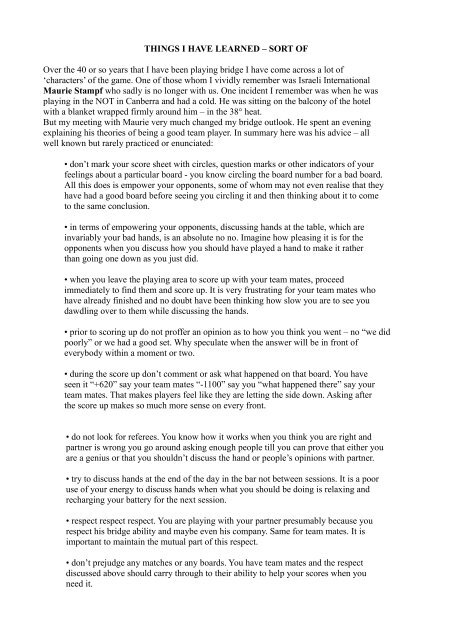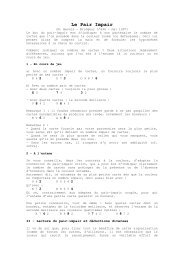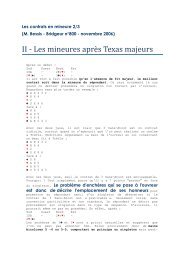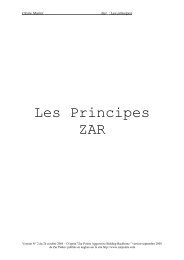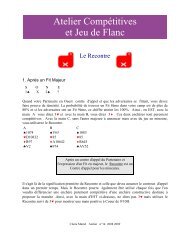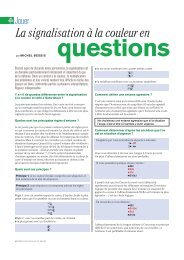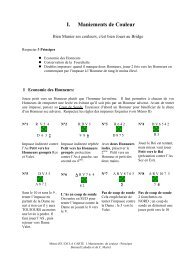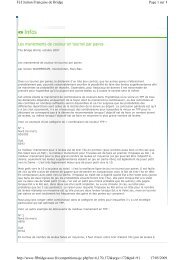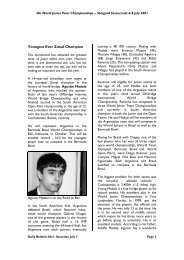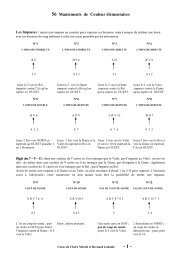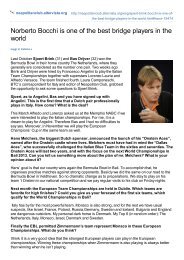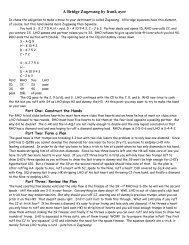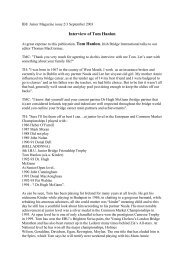How to be a good Team Mate - Claire Bridge
How to be a good Team Mate - Claire Bridge
How to be a good Team Mate - Claire Bridge
Create successful ePaper yourself
Turn your PDF publications into a flip-book with our unique Google optimized e-Paper software.
THINGS I HAVE LEARNED – SORT OF<br />
Over the 40 or so years that I have <strong>be</strong>en playing bridge I have come across a lot of<br />
‘characters’ of the game. One of those whom I vividly remem<strong>be</strong>r was Israeli International<br />
Maurie Stampf who sadly is no longer with us. One incident I remem<strong>be</strong>r was when he was<br />
playing in the NOT in Can<strong>be</strong>rra and had a cold. He was sitting on the balcony of the hotel<br />
with a blanket wrapped firmly around him – in the 38° heat.<br />
But my meeting with Maurie very much changed my bridge outlook. He spent an evening<br />
explaining his theories of <strong>be</strong>ing a <strong>good</strong> team player. In summary here was his advice – all<br />
well known but rarely practiced or enunciated:<br />
• don’t mark your score sheet with circles, question marks or other indica<strong>to</strong>rs of your<br />
feelings about a particular board - you know circling the board num<strong>be</strong>r for a bad board.<br />
All this does is empower your opponents, some of whom may not even realise that they<br />
have had a <strong>good</strong> board <strong>be</strong>fore seeing you circling it and then thinking about it <strong>to</strong> come<br />
<strong>to</strong> the same conclusion.<br />
• in terms of empowering your opponents, discussing hands at the table, which are<br />
invariably your bad hands, is an absolute no no. Imagine how pleasing it is for the<br />
opponents when you discuss how you should have played a hand <strong>to</strong> make it rather<br />
than going one down as you just did.<br />
• when you leave the playing area <strong>to</strong> score up with your team mates, proceed<br />
immediately <strong>to</strong> find them and score up. It is very frustrating for your team mates who<br />
have already finished and no doubt have <strong>be</strong>en thinking how slow you are <strong>to</strong> see you<br />
dawdling over <strong>to</strong> them while discussing the hands.<br />
• prior <strong>to</strong> scoring up do not proffer an opinion as <strong>to</strong> how you think you went – no “we did<br />
poorly” or we had a <strong>good</strong> set. Why speculate when the answer will <strong>be</strong> in front of<br />
everybody within a moment or two.<br />
• during the score up don’t comment or ask what happened on that board. You have<br />
seen it “+620” say your team mates “-1100” say you “what happened there” say your<br />
team mates. That makes players feel like they are letting the side down. Asking after<br />
the score up makes so much more sense on every front.<br />
• do not look for referees. You know how it works when you think you are right and<br />
partner is wrong you go around asking enough people till you can prove that either you<br />
are a genius or that you shouldn’t discuss the hand or people’s opinions with partner.<br />
• try <strong>to</strong> discuss hands at the end of the day in the bar not <strong>be</strong>tween sessions. It is a poor<br />
use of your energy <strong>to</strong> discuss hands when what you should <strong>be</strong> doing is relaxing and<br />
recharging your battery for the next session.<br />
• respect respect respect. You are playing with your partner presumably <strong>be</strong>cause you<br />
respect his bridge ability and may<strong>be</strong> even his company. Same for team mates. It is<br />
important <strong>to</strong> maintain the mutual part of this respect.<br />
• don’t prejudge any matches or any boards. You have team mates and the respect<br />
discussed above should carry through <strong>to</strong> their ability <strong>to</strong> help your scores when you<br />
need it.
• Focus focus focus. We all know that bridge is a game of mistakes then why do some<br />
people make more and some less. Simple – focus. Top players are able <strong>to</strong> focus much<br />
<strong>be</strong>tter than those who are there simply for a social outing<br />
OK so you are now asking do I practice these team etiquette rules. In all honesty I can<br />
confidently say......no but (apart from table discussions of course) probably 95% plus.<br />
Your team will certainly <strong>be</strong> more harmonious if you stick with these rules and harmony<br />
translates in<strong>to</strong> <strong>be</strong>tter results – trust me!<br />
From Gold Coast Congress Bulletins 2008 Saturday March 1st


